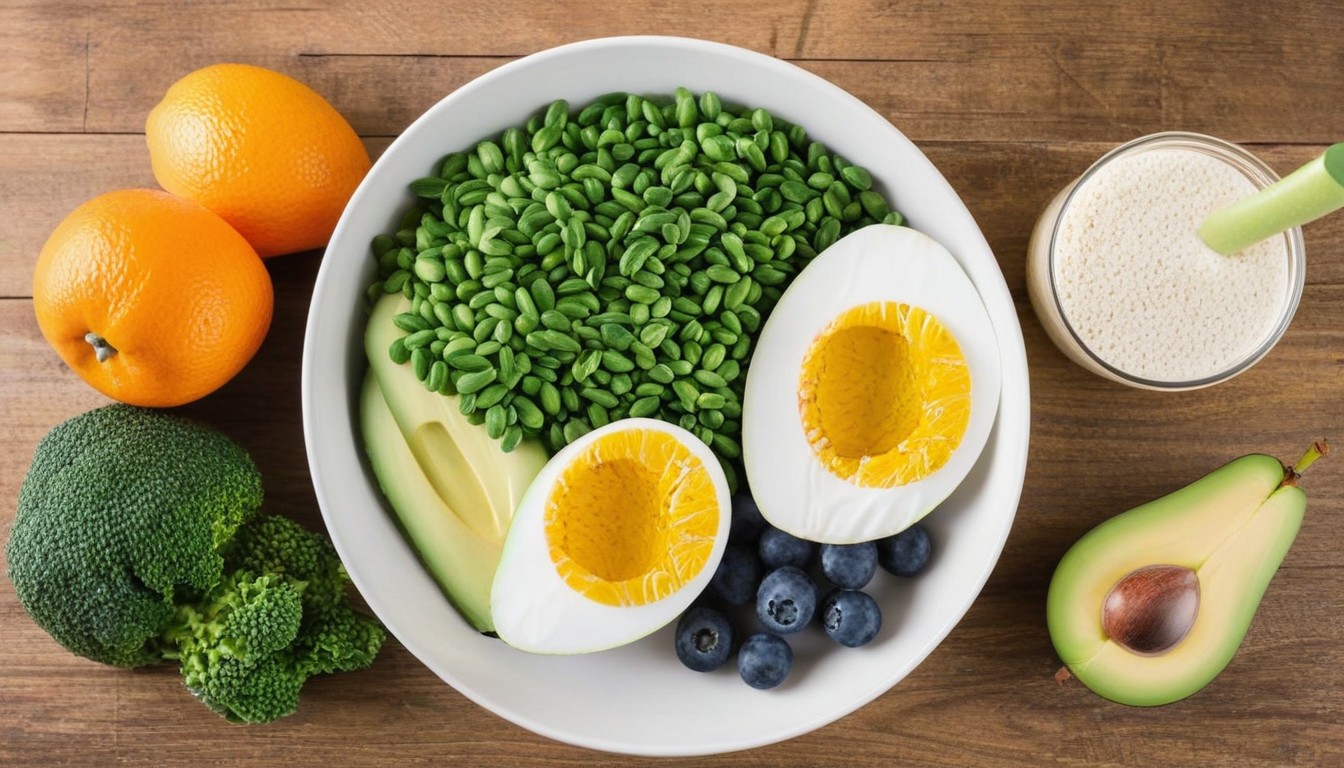In this comprehensive blog post, we will delve into the essential role of protein in men’s health and debunk common myths surrounding protein intake. As a nutrition blogger, I aim to provide you with the most up-to-date, evidence-based information to help you make informed dietary choices. In addition to discussing the importance of protein for men’s health, we will also share a free 7-day meal plan to help you incorporate a balanced protein intake into your daily routine.

Introduction
Protein is an essential macronutrient that plays a crucial role in men’s health. It is necessary for building and repairing tissues, producing enzymes and hormones, and maintaining a healthy immune system. However, there are many myths and misconceptions surrounding protein intake that can lead to confusion and misinformation. In this blog post, we will explore the importance of protein in men’s health and debunk common myths related to protein intake. We will also provide you with a free 7-day meal plan to help you incorporate a balanced protein intake into your daily routine. So, let’s dive in and separate fact from fiction when it comes to protein and men’s health.
Protein and Muscle Health
Protein plays a crucial role in muscle growth and maintenance, and it is essential for men to consume enough protein to support their muscle health. The recommended daily allowance (RDA) for protein varies depending on factors such as age, weight, and activity level. For a 180-pound (81.8 kg) male, for example, the RDA ranges from 98 to 131 grams of protein daily, combined with resistance training, to support muscle growth.
Optimal Protein Intake for Supporting Muscle Mass
Research suggests that the optimal amount of protein for muscle-building appears to be between 1.2 and 1.6 grams per kg of body weight. This is higher than the current RDA, which may contribute to the decreased effects of protein intervention in some studies. To meet the RDA and support muscle growth, it is recommended to consume approximately 45 mg/kg/day of leucine and 22.5 mg/kg/day of isoleucine and valine, as these amino acids are crucial for muscle adaptations with exercise training.
Protein Sources for Muscle Health
There are both animal-based and plant-based protein sources that can help support muscle health. Animal-based protein sources include:
- Lean meats (beef, pork, or lamb)
- Poultry
- Eggs
- Fish and seafood
- Dairy products
- Whey protein powders
Plant-based protein sources include:
- Beans
- Peas
- Nuts
- Lentils
- Seeds
- Soy products
- Plant-based protein powders
Incorporating a variety of protein sources into your diet can help ensure adequate protein intake for muscle health and growth.
Protein and Heart Health
The impact of different protein sources on heart health has been a topic of interest in recent years. While protein is essential for overall health, some studies suggest that certain protein sources may be more beneficial for heart health than others.
Animal-Based vs. Plant-Based Protein
Research has shown that a high intake of red meat, especially processed versions (sausage, bacon, hot dogs, salami), is linked to a modestly higher risk of death, while a higher protein intake from plant foods carries a lower risk. Plant-based protein sources, such as beans, peas, nuts, lentils, seeds, soy products, and plant-based protein powders, have been associated with reduced blood pressure and a more favorable lipidemic profile. In contrast, animal-based protein sources, such as lean meats, poultry, eggs, fish and seafood, dairy products, and whey protein powders, have been associated with an increased risk of cardiovascular disease and death.
Optimal Protein Intake for Heart Health
The optimal protein intake for heart health is still a topic of debate. While some studies suggest that high protein diets may increase cardiovascular risk, others have found no significant association between protein intake and cardiovascular outcomes. However, it is generally recommended to consume a balanced diet that includes healthy sources of protein from both plant and animal sources to support overall health and reduce the risk of chronic diseases, including heart disease.In conclusion, while the impact of different protein sources on heart health is still a topic of ongoing research, it is generally recommended to consume a balanced diet that includes healthy sources of protein from both plant and animal sources to support overall health and reduce the risk of chronic diseases, including heart disease.

Protein and Longevity
The potential effects of protein intake on longevity have been a topic of interest in recent years. While there is no definitive answer to the optimal protein intake for longevity, some studies suggest that certain dietary strategies may have an impact on overall health and well-being throughout life.
Animal Protein Restriction and Longevity
Some research indicates that calorie restriction and protein restriction may contribute to increased longevity. In particular, studies on animals have shown that protein restriction can extend lifespan and improve health during aging. However, it is essential to note that these findings are from animal studies and may not directly apply to humans.
Protein Quality and Longevity
The quality of protein sources may also play a role in longevity. High-quality protein sources, such as lean meats, poultry, fish, and dairy products, provide essential amino acids and other nutrients that support overall health. On the other hand, low-quality protein sources, such as processed meats and high-fat dairy products, may contribute to chronic diseases and negatively impact longevity.
Balanced Protein Intake for Optimal Health
To promote longevity and overall health, it is generally recommended to consume a balanced diet that includes high-quality protein sources from both plant and animal sources. This approach can help ensure adequate protein intake for muscle health, immune function, and overall well-being throughout life.In conclusion, while the impact of protein intake on longevity is still a topic of ongoing research, it is generally recommended to consume a balanced diet that includes high-quality protein sources from both plant and animal sources to support overall health and reduce the risk of chronic diseases, including heart disease.
Protein Myths vs. Facts
There are many myths and misconceptions surrounding protein intake that can lead to confusion and misinformation. In this section, we will address some common protein myths and provide evidence-based facts to debunk them.
Myth #1: “All Proteins Are Created Equal”
Reality Check: Unveiling the Distinctions in Protein Offerings Protein diversity takes the front stage in the vast global market, showcasing a diverse range of sources with their own specific compositions and inherent benefits. Understanding the limitations and taking individual protein demands can help people ensure their protein intake is optimal for their health and fitness goals.
Myth #2: “Protein Consumption Only Leads to Bulky Muscles”
Busting the Myth: Revealing the Myriad Benefits of Protein
Protein is essential for muscle growth and maintenance, but it also plays a crucial role in many other bodily functions, including immune function, hormone production, and enzyme synthesis. Consuming protein in moderation, combined with regular exercise, can help support overall health and well-being.
Myth #3: “Plant-Based Proteins are Incomplete and Inefficient”
Separating Fact from Fiction: The Superiority of Plant-Based Proteins Contrary to common opinion, plant-based proteins derived from legumes, grains, and seeds provide all of the necessary amino acids required by the body. They give a thorough and balanced amino acid profile, making them a healthy and sustainable protein source.
Myth #4: “You Can Only Absorb 30 Grams of Protein per Meal”
Reality Check: Debunking the Protein Absorption Myth. There is no evidence to support the claim that the body can only absorb a limited amount of protein per meal. The body can absorb and utilize protein from meals of varying sizes and compositions, and the optimal protein intake for muscle growth and maintenance is based on total daily intake, not meal timing.In conclusion, it is essential to separate fact from fiction when it comes to protein intake. Consuming a balanced diet that includes high-quality protein sources from both plant and animal sources can help support overall health and well-being.
Conclusion
In conclusion, protein is an essential macronutrient that plays a crucial role in men’s health. It is necessary for building and repairing tissues, producing enzymes and hormones, and maintaining a healthy immune system. However, there are many myths and misconceptions surrounding protein intake that can lead to confusion and misinformation.We have discussed the importance of protein in muscle growth and maintenance, heart health, and longevity.
We have also addressed common protein myths, such as the belief that all protein sources are equal, and provided evidence-based facts to debunk them.To make informed dietary choices regarding protein for men’s health, it is recommended to consume a balanced diet that includes high-quality protein sources from both plant and animal sources.
It is also important to consider individual protein demands and adjust portion sizes and ingredients according to personal preferences and nutritional needs.Incorporating a variety of protein sources into your diet can help ensure adequate protein intake for muscle health, immune function, and overall well-being throughout life. Remember to consult with a healthcare professional or registered dietitian before making significant changes to your diet.
Free 7-Day Meal Plan
Here is a free 7-day meal plan to help you incorporate a balanced protein intake into your daily routine:
Day 1
- Breakfast:
- 1 cup cooked oatmeal
- 6 oz low-fat Greek yogurt
- 1 scoop protein powder (optional)
- 1 cup mixed berries
- Lunch:
- 4 oz grilled chicken breast
- 1 cup cooked brown rice
- 1 cup steamed broccoli
- 1/4 avocado
- Dinner:
- 4 oz baked salmon
- 1 medium baked sweet potato
- 1 cup steamed green beans
- 1/4 cup cooked quinoa
Day 2
- Breakfast:
- 1 cup cooked quinoa
- 6 oz low-fat Greek yogurt
- 1 scoop protein powder (optional)
- 1 cup mixed berries
- Lunch:
- 4 oz tuna salad (made with low-fat mayo)
- 1 cup cooked whole-grain crackers
- 1 cup mixed salad greens
- 1/4 cup chopped cucumber
- Dinner:
- 4 oz grilled tofu
- 1 cup cooked couscous
- 1 cup steamed zucchini
- 1/4 cup cooked chickpeas
Day 3
- Breakfast:
- 1 cup cooked oatmeal
- 6 oz low-fat Greek yogurt
- 1 scoop protein powder (optional)
- 1 cup mixed berries
- Lunch:
- 4 oz turkey breast
- 1 cup cooked brown rice
- 1 cup steamed green beans
- 1/4 avocado
- Dinner:
- 4 oz baked cod
- 1 medium baked sweet potato
- 1 cup steamed broccoli
- 1/4 cup cooked quinoa
Day 4
- Breakfast:
- 1 cup cooked quinoa
- 6 oz low-fat Greek yogurt
- 1 scoop protein powder (optional)
- 1 cup mixed berries
- Lunch:
- 4 oz chicken salad (made with low-fat mayo)
- 1 cup cooked whole-grain crackers
- 1 cup mixed salad greens
- 1/4 cup chopped cucumber
- Dinner:
- 4 oz grilled steak
- 1 cup cooked couscous
- 1 cup steamed zucchini
- 1/4 cup cooked chickpeas
Day 5
- Breakfast:
- 1 cup cooked oatmeal
- 6 oz low-fat Greek yogurt
- 1 scoop protein powder (optional)
- 1 cup mixed berries
- Lunch:
- 4 oz turkey and avocado wrap
- 1 cup cooked brown rice
- 1 cup steamed green beans
- 1/4 avocado
- Dinner:
- 4 oz baked salmon
- 1 medium baked sweet potato
- 1 cup steamed broccoli
- 1/4 cup cooked quinoa
Day 6
- Breakfast:
- 1 cup cooked quinoa
- 6 oz low-fat Greek yogurt
- 1 scoop protein powder (optional)
- 1 cup mixed berries
- Lunch:
- 4 oz tuna salad (made with low-fat mayo)
- 1 cup cooked whole-grain crackers
- 1 cup mixed salad greens
- 1/4 cup chopped cucumber
- Dinner:
- 4 oz grilled tofu
- 1 cup cooked couscous
- 1 cup steamed zucchini
- 1/4 cup cooked chickpeas
Day 7
- Breakfast:
- 1 cup cooked oatmeal
- 6 oz low-fat Greek yogurt
- 1 scoop protein powder (optional)
- 1 cup mixed berries
- Lunch:
- 4 oz chicken salad (made with low-fat mayo)
- 1 cup cooked whole-grain crackers
- 1 cup mixed salad greens
- 1/4 cup chopped cucumber
- Dinner:
- 4 oz grilled steak
- 1 cup cooked couscous
- 1 cup steamed zucchini
- 1/4 cup cooked chickpeas
This 7-day meal plan provides a variety of protein sources, including lean meats, fish, tofu, and eggs, to help you maintain a balanced protein intake throughout the week. Remember to adjust portion sizes and ingredients according to your personal preferences and nutritional needs.


Meet Author
I am a Health/Wellness and Nutrition Blogger. Bringing you well-researched details on your nutrition and health information. I love Helping you enjoy good health with the right choice of food.
Disclaimer
The information provided on this page is intended for general informational purposes only and was gathered by research on general nutrition science and experiments. The content is not intended to be a substitute for your specific professional medical, nutritional, or fitness advice, diagnosis, or treatment.
Recent Posts
- 7 Surprising Reasons Why You Need a Balanced Diet Every Day as a Woman
- The Mediterranean Diet and Dementia: Protecting Brain Health
- Superfoods for Brain Health: Diet To Fight Dementia
- Nutritional Strategies for Managing Dementia Symptoms
- How To Recognize Early Signs and Symptoms of Dementia
- Managing Lewy Body Dementia: Understanding Symptoms and Nutrition
- Understanding Vascular Dementia: Causes, Symptoms, and Dietary Solutions
- Alzheimer’s Disease and The Right Diet: All You Need To Know
- Dementia vs. Normal Aging: Debunking Myths and Clarifying Realities
- What are The Risk Factors for Dementia?
- Dementia And Omega 3 Fatty Acid ( Eicosapentaenoic acid )
- The Role of Nutrition in Dementia Prevention
- Dementia: An Introduction to the Condition and Management
- Okra Extract Supplements: A Nutrient-Rich Addition to Your Wellness Routine
- Okra and Eye Health: Okra and Vitamin A for Clear Vision
- Fuel Your Fitness: Okra’s Role in Sustaining Energy and Enhancing Muscle Recovery
- Age Gracefully with Okra: Supporting Joint Health in the Elderly
- Slim Down with Okra: Low-Calorie Smoothie Recipes
- Why Okra is a Must-Have for Pregnant Mom: The Folate Advantage
- DIY Beauty: Okra-Based Face Masks for Radiant Skin
- Boosting Milk Supply: The Okra Advantage for Nursing Moms
- Boost Your Child’s Growth with Okra: A Nutrient-Packed Superfood
- How Okra Supports Cycle Regularity: The Menstrual Miracle
- Boosting Testosterone Naturally: The Role of Okra in Men’s Health
- Detox Delight: How Okra Supports Your Body’s Natural Cleansing Process
- How Okra Fights Cancer: Okra and Cancer Prevention
- Explore 10 Health Benefits Of Garlic: A Comprehensive Guide
- Health Benefits of Garlic for Fighting Cough and Cold Infections
- Can Garlic Be Used As a Natural Antibiotic?
- How Effective is Garlic in Lowering Cholesterol And Improving Heart Health?







